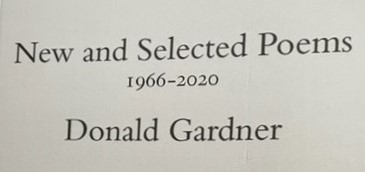
New and Selected Poems, 1996-2020. Donald Gardner. Grey Suit. 225 pages.
Reviewed by Kevin T McEneaney
One of the reasons most people don’t read poetry is that poets take themselves too seriously: serious about their craft, subjects chosen, their advanced vocabulary, posthumous ambition, etc. One can stand outside of all this nonsense and make fun of expected notions and subtle prejudice, which is what Donald Gardner has done for the past forty years, but one then pays for the silent treatment of dismissal: yes, he is funny, quirky, formless, but not serious despite his obvious talent. It is endlessly debatable whether talent or wit is more important, yet the latter presumes the former.
While Gardner pretended to be poor planet Pluto on the fringes of Beat Bohemia, he is really the great planet Saturn who reverses everything, including gravity, into the wealth of laughter from the unspoken edges of daily routine. As he said in his How to get the most out of your jet lag (2000), “My poems are self-explanatory, / but they don’t explain anything else.” And yet his humorous modesty comments, consoles, illuminating the travails of daily life with gentle smile.
Concise lines of crystalline free verse examine unsuspected avenues and back alleys of thought—nothing conventional appeals to him, although he strives to be conventional, as he fails in spectacular manner, even if it is such a simple task as “strangling the neck of a rubbish bag” or more ambitiously having a tennis match with Death.
The larger selection of his poems here are recent poems; one experiences summation of work plus new observations on the difficulties and illusions of old age. Quite often poems begin as if they are irrelevant dead ends, shards that can’t be glued back together, then suddenly at the end a poetic reversal make everything whole. Garner’s laughter is itself a healing remedy for the foibles of our lives, a perspective which transforms this humble mutterer into an unexpected voice of practical wisdom.
Settings of poems vary from England (where he was born, graduating from Oxford), Holland (where he has resided most of his life), Ireland (where he has traveled often), and Italy (whose poets he has translated), as well as the United States (where he has often read). Gardner’s versality is such that he appears to be able to write about anything in life, whether insignificant themes like feet or elbows, or important themes like memorial poems to friends, or even keen observations on literature.
Technically speaking, Gardner writes free verse, yet evocative slant rhymes and slat rhymes often sneak into his diction; he has a gift for ironic brevity whereby his droll observations linger. “Overspill” begins:
Late in your life you catch yourself loitering in the corridors of useless knowledge. The mind, finding no safe harbor, seeks shelter in a snowstorm of forgetting. Or else you set about decluttering, getting rid of all you no longer need. Making space for emptiness. Traveling light for your journey into the sidelines.
Yet there is nothing light or empty here for your own journey into the Gardener carnival of wit, wisdom, and laughter.